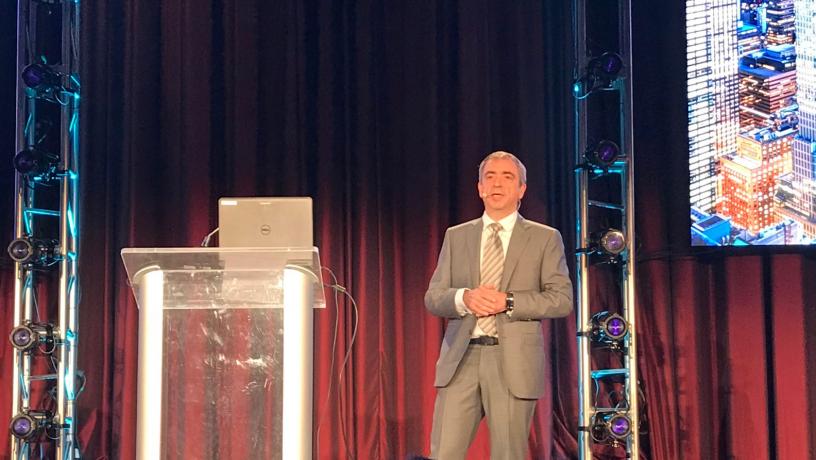Prof. Fish Leads 13th World Congress in Computational Mechanics in NYC
Led by Civil Engineering Professor Jacob Fish, the 13th World Congress in Computational Mechanics (WCCM) of the IACM (International Association for Computational Mechanics) brought together more than 3200 of the world’s leading experts in multiple sectors, including academia, national laboratories, federal agencies, and industry. WCCM, which is held every two years, is one of the largest computational mechanics conferences in the world.
This year’s conference, hosted July 22-27 at the Marriott Marquis in New York City, focused on simulation-driven innovation that transforms design and decision-making processes in a wide range of fields, including health care research, national security issues, extreme weather predictions, and financial risk, to name just a few.
“I was highly honored when the IACM leadership asked me to take on the General Program Chairmanship for WCCM 2018,” said Fish, Carleton Professor of Civil Engineering and Engineering Mechanics at Columbia Engineering, who spent more than three years planning the event. “This is a major recognition of the fact that Columbia has risen to become one of the top three universities in the field of computational science and engineering. I am grateful to all my colleagues both here at Columbia Engineering and at many other institutions for all their incredibly hard work and dedication to putting together the best-ever WCCM conference.”
Fish worked closely with WCCM’s Honorary Chair Thomas J.R. Hughes (University of Texas at Austin) and Technical Program Chair Haim Waisman (Columbia Engineering) to organize the conference. His local organizing committee included Civil Engineering Professors Waiching Sun (chair), Patricia Culligan (who also was co-organizer of the “Visionary Talks” series), Marco Giometto, Ioannis Kougioumtzoglou, and Mechanical Engineering Professor Kristin Myers, along with staff members and more than 30 Columbia University graduate students.
Plenary talks were given by Michael Levitt, 2013 Nobel Laureate in Chemistry and professor of structural biology at Stanford University, and Arvind Krishna, senior vice president at IBM and director of IBM Research. WCCM also featured more than more than 300 minisymposia in 19 tracks, including Biomechanics and Mechanobiology; Uncertainty Quantification, Reliability and Error Estimation; Additive Manufacturing; Nano- and Micro-Mechanics of Materials; and Data Driven Analysis and Machine Learning.
“With so many significant advances in science, engineering, health care, and finance, the world is rapidly changing, and we are very excited about what kinds of ideas will come out of WCCM 2018,” Fish said. “This is only the second time WCCM has been held in the U.S. and we see New York City as the perfect site both for bringing together a critical mass of great thinkers and for igniting all kinds of computational software startups that require minimal space. All these startups need is access to the internet and cloud computing, which you can so easily find here.”
WCCM 2018 included a new feature—a series of lunchtime “Visionary Talks” given by preeminent leaders in engineering and applied science who focused on their visions for the future of science and engineering. The talks were designed to provoke discussion around important new directions for engineering and applied science that may impact research, education, and practice far into the 21st century.
The speakers were:
- Shirley Jackson, President, Rensselaer Polytechnic Institute, and former Chairman of the U.S. Nuclear Regulatory Commission
- Sarah Marcella Springman, Rector, ETH Zürich (Swiss Federal Institute of Technology
- Susan Seestrom, Director of Advanced Science & Technology & Chief Research Officer, Sandia National Laboratories.
- Jessica Hodgins, former Vice President of Research, Disney, and Professor of Computer Science and Robotics at Carnegie Mellon University.
- James Warren, Director, Materials Genomics, NIST (National Institute of Standards and Technology).
WCCM 2018 participants included representatives from U.S. national labs, including Sandia, Argonne, Brookhaven, Oak Ridge, Berkeley, Los Alamos, Lawrence Livermore, NIST, and NASA; and a broad array of companies, including Airbus, Altair, ANSYS, AutoDesk, BASF, Boeing, Bosch, Dassault Systèmes, ESI, Exxon, Fujitsu, General Motors, Honda, IBM, Metso, Nippon Steel, Orano, Posco, Pratt, Safran, Samsung, Schlumberger, Schrödinger, Siemens, and Toyota. With so many leading specialists in attendance, WCCM 2018 offered VCs an opportunity to meet the most brilliant minds at the forefront of predictive medicine, additive manufacturing, advance materials, genomics, and simulation-driven design.
“This was an amazing and impactful Congress. So many of our advances in science and engineering are now tied to computational methods and devices that are essential to design and manufacturing,” said Mary C. Boyce, Dean of Columbia Engineering. “By drawing together so many leaders in this broad field, WCCM 2018 was the perfect catalyst to bring new ideas and applications to the forefront, and new business to New York City.”
Tinsley Oden, a pioneering researcher in the field of computational mechanics, associate vice president for research and founding director of the Institute for Computational Engineering and Sciences at the University of Texas at Austin, added, “This was a super Congress. It will be always remembered as a great event and the best WCCM. The organization was masterful. It is a model all future Congresses should follow.”

Civil Engineering Professor Jacob Fish welcomes attendees to the 13th World Congress in Computational Mechanics.
